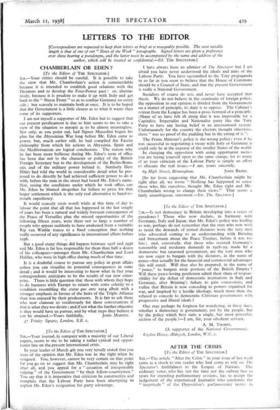LETTERS TO THE EDITOR
[Correspondents are requested to keep their letters as brief as is reasqnably possible. The most suitable length is that of one of our " News of the Week " paragraphs. Signed letters are given a preference over those bearing a pseudonym, and the latter must be accompanied by the name and address of the author, which will be treated as confidential.—Ed. THE SPECTATOR.]
CHAMBERLAIN OR EDEN ?
[To the Editor of THE SPECTATOR.] Sot,—Your critics should be careful. It is possible to take the view that Mr. Chamberlain's action is commendable because it is intended to establish good relations with the Dictators and to develop the Four-Power pact : or, alterna- tively, because it is prudent to make it up with Italy and get back to the " Stresa Front " so as to confine Germany on every side ; but scarcely to maintain both at once. It is to be hoped that the Government is a little clearer as to what it wants than some of its supporters.
I am not myself a supporter of Mr. Eden but to suggest that our present predicament is due to him seems to me to take a view of the situation so myopic as to be almost meaningless. Not only, as you point out, had Signor Mussolini begun his plan for the Abyssinian War long before Mr. Eden came to power, but, much earlier still, he had compiled the Fascist philosophy from which his actions in Abyssinia, Spain and the Mediterranean are logical conclusions. The reason why he has been more bellicose during Mr. Eden's term of office has been due not to the character or policy of the British Foreign Secretary but to the development of the Berlin-Rome axis and of the military power behind it. Similarly Herr Hitler had told the world in considerable detail what he pro- posed to do directly he had achieved sufficient power to do it with, before the man in the street had heard Mr. Eden's name. Nor, seeing the conditions under which he took office, can Mr. Eden be blamed altogether for failure to press for that -larger settlement which is the only real alternative to hand-to- mouth expediency.
It would scarcely seem worth while at this time of day to labour the point that all that has happened in the last couple of years has been a natural and widely foreseen consequence of the Peace of Versailles plus the missed opportunities of the following fifteen years, were there not so large a number of people who appear suddenly to have awakened from a veritable Rip van Winkle trance to a fixed conception that nothing really occurred of any significance in international affairs before 1936.
But a good many things did happen between 1918 and 1936 and Mr. Eden is far less responsible for them than half a dozen of his colleagues—amongst them Mr. Chamberlain and Lord Halifax, who were in high office during much of that time.
It is a doubtful course to pursue any policy in great affairs unless you can visualise its potential consequences in some detail ; and it would be interesting to know what in fact your correspondents anticipate to be the results of our new enter- prise. There is little question that those with whom they hope to do business wish Europe to return with some celerity to a condition resembling the status quo ante 1914 albeit with a stronger emphasis in favour of the heirs of the Triple Alliance than was enjoyed by their predecessors. It is fair to ask those who now clamour so vociferously for these conversations if that is what they too desire ; and if not what the further objective is they would have us pursue, and by what steps they believe it can be attained.—Yours faithfully, JOHN MARTIN. 37 Trinity Square, London, S.E. r.










































 Previous page
Previous page